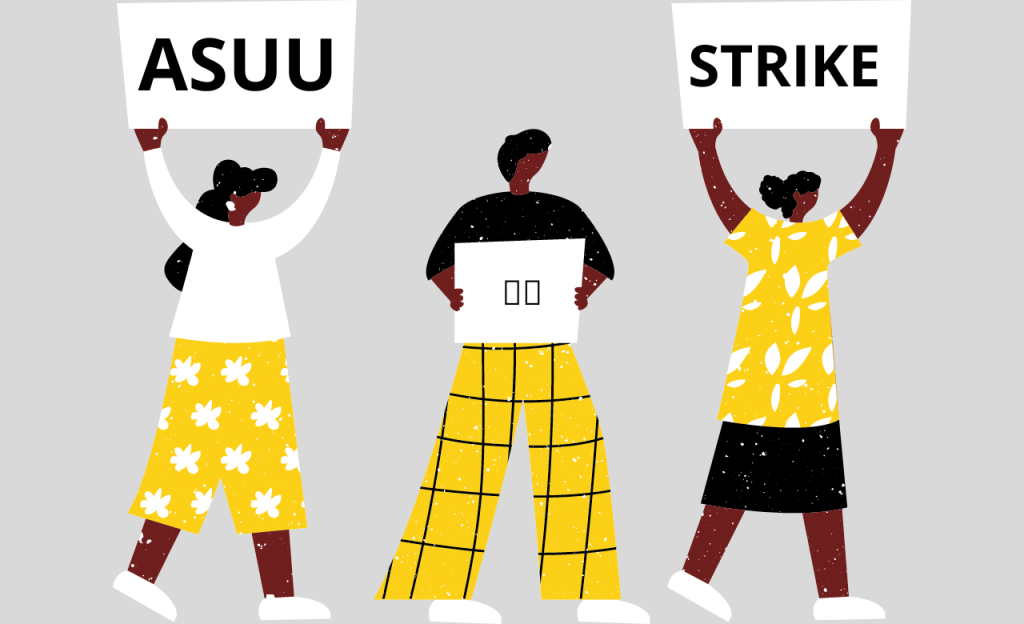One morning, I was leaving for lectures. I was up early as usual and was readily dressed in my white and black. We had an assignment to submit before 8am, so I had to leave very early in order to beat the deadline. Down the rough part of the hostel as I left for school, I overhead some boys rejoicing out of unwarranted reasons, or at least that’s what it seemed to me at the moment. The Academic Staff Union of Universities (ASUU) had started their strike again, and this time it was until further notice. A swift but short-lived feeling of joy swept through my heart upon hearing the news. Michael and David; my elder siblings had already spent nine years studying a five year course as a result of a similar situation as this. Shaking my head, I went back to my hostel. “I’ve wasted my white again” I muttered to myself, my medical school made it compulsory for medical students to wear white and black to school daily and for obsessively neat students like me, washing this whites everyday wasn’t any fun. Days passed into weeks and weeks moving up to months, yet we were still kept in the dark.
The history of Higher education in Nigeria cannot be told without the inclusion of events and periods of strikes. Strikes of various natures and of different reasons have become a normal phenomenon in growing inconsiderate policy making relationship between the government and academia. Though it is stipulated in the constitution that strikes can be used as avenues to express public opinion which can bring positive changes. However, the institutions of higher education are still facing instability and ills despite the strikes, policies money, corruption, knowledge and human resources that are put into it. The standard and products of Nigeria’s higher education are getting lower despite highly improved inputs and this situation is mirrored effectively in the Nigerian economy.
Several literatures have examined the significant relationship between university education and societal development. For about a thousand year now, universities have existed and played vital role in educating a greater portion of individuals, perform research, advance understanding and new technologies and breed new potentials for action. At such, the importance of universities cannot be over emphasized. Regrettably, irrespective of the numerous advantages of university education in Nigeria, the educational sector still faces numerous challenges. These challenges have deterred the sector from achieving optimum results and meeting-up the requirements of the 21st century. According to Aidelunoghene(2014), the standard of education in Nigeria is deteriorating as the day goes by.
The Academic Staff Union of the University (ASUU) was a subset of the Nigerian Association of university teachers formed in 1965. The Academic Staff Union of the University (ASUU) gain autonomy in 1978 and began to operate as a union that fights for the right of her members. The union is further saddled with the responsibility of assisting the stakeholder in attaining the aimed classic standard of education through the provision of quality education in the Nigerian university system. Further, the union also support the struggle just like another union to ensure adequate welfare of her member, job security for her member and facilitate enabling working environment for her member.
In a bid for the Academic Staff Union of Universities to ensure that the government pays some listening ear to the problem bedeviling the educational system of the country, they explored several industrial actions. Popular among these actions is the strike which is the outright stoppage of work by all Academics Staff of public universities in the country. However, such industrial actions which the Academic Staff Union of Universities(ASUU) uses, plays a very devastating role on the students and on the educational system of the country. As such, this theoretical complementary seek to examine the extent to which the Academic Staff Union of the University(ASUU) strikes influences tertiary educational system in Nigeria and the adequate solution in curbing it.
As stated by Punch Newspaper, the Academic Staff Union of University(ASUU) has spent one thousand five hundred (1500) days on strike in 21 years. Logically, the Academic Staff Union of University(ASUU) has spent four (4) years and thirty-nine (39) days on strike out of twenty-one years (21). This is quite an astonishing static and poses a very serious threat on the educational system of Nigeria.
One of the determinant of the progress of the educational system of any country, is the ability to eliminate poor performance amongst students and however, the likelihood of Nigeria achieving this, is in doubt. One reason to this; is the regular occurrence of the Academic Staff Union of University(ASUU) strikes. Empirical result as shown that students performance in examination drops upon resumption from a strike. This is due to the fact that students are far from the academic environment during the strike. As such, less credence is given to reading and all forms of academic activities. Incessant strike actions culminate into the erosion of academic quality.
The rate of school drop-out in Nigeria is becoming increasingly remarkable and has exceed that of other countries, as Nigeria is regarded as the home country for the highest rate of school drop-out. According to the report given by the United Nations(UN), over 55 million children were regarded as school drop-out in 2010 and has increased to over 57 million in 2011. One of the factors responsible for the high rate of school drop-out in Nigeria, is the incessant industrial activities of ASUU. As a result of the incessant industrial activities of ASUU, most students deem it fit to venture into the street in search for greener pasture in which the earn a stipend. As such, they find it difficult to go back to school upon resumption. The general belief is that, there is no opportunity of getting such job that will ensure that they earn a huge sum of money after school.
According to the stakeholders meeting held on September 12, 2013. The Academic Staff Union of Universities (ASUU) has been going on strike for a number of years over the same issue and yet nothing seemed to have changed. The vast majority of the issues faced by the Academic Staff Union of Universities (ASUU), is the inadequate funding of the tertiary institution in educating a greater portion of individuals and performing research. One way of eliminating this incessant ASUU strike actions, is by the government honoring the agreements reached by ASUU and to adequately fund the tertiary institution. Governments has to learn to keep to bargains and meet up with their obligations; they should not wait to be reminded by ASUU, as ASUU has been drawing their attention to outstanding in terms of allowances.
The educational standard in Nigeria has fallen much more than in the past decades and as a result has prompted the Academic Staff Union of Universities (ASUU) to remain on subsequent strikes, due to the poor working environment. This is the reason why the Academic Staff Union of Universities (ASUU) are asking for joint cooperation with the government. The government is just interested in admitting students into the university and not asking themselves how many students a lecturer should be able to handle. There is an urgent need for the government to cooperate with the Academic Staff Union of Universities (ASUU) to improve the standard of education in the government and to device a better working condition of the members of the Academic Staff Union of Universities (ASUU), so as prevent the inclusion of strike in the educational sector.
In conclusion, Higher education is the last molding process of the literate human resource of any country. It should not be open to strikes which constantly disrupt this process of preparation. In a bid to improve the standard of education in Nigeria, this concept tends to explore the implications of incessant strike on the technical education program in Nigeria and the adequate solutions to the incessant industrial activities of ASUU.
Opara Udochukwu Kingsley, a 100 level medical student of Alex Ekwueme Federal University of Ndufu Alike Ikwo (AE-FUNAI) Ebonyi state wrote in from oparaudochukwu277@gmail.com






